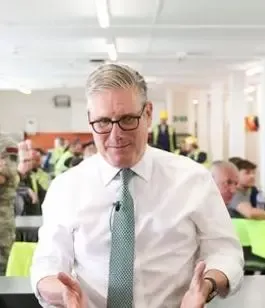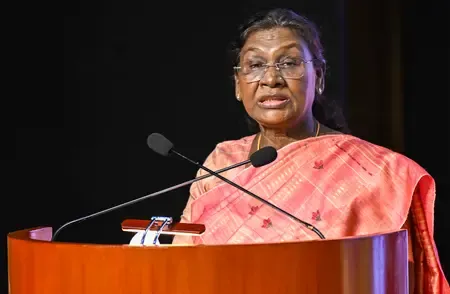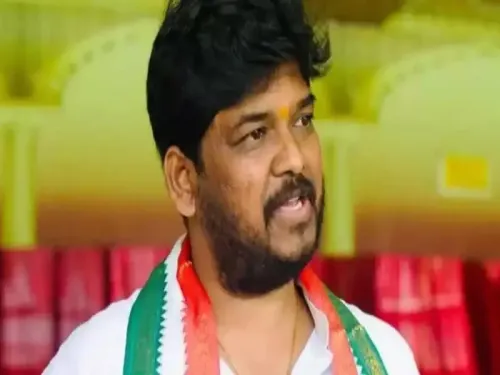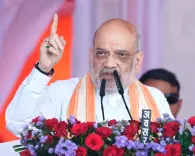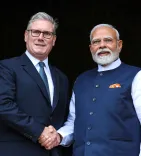Could US Strikes Create a Path for Iran to Negotiate?

Synopsis
Key Takeaways
- US strikes target key Iranian nuclear facilities.
- Ambassador Azar stresses the importance of compliance from Iran.
- There is a potential opportunity for renewed diplomatic talks.
- Israel's military actions aim to protect national security.
- Continued monitoring of Iran's nuclear program is essential.
New Delhi, June 22 (NationPress) The Israeli Ambassador to India, Reuven Azar, commended the United States for its efforts in limiting Iran’s nefarious nuclear ambitions, stating that this brings a fresh opportunity for the nation to return to the negotiating table 'in good faith.' On Sunday, US forces targeted three underground sites in Iran—Fordow, Isfahan, and Natanz—which are believed to be crucial for uranium enrichment.
Below is the complete interview:
IANS: Can you elaborate on the reality behind Iran’s assertion that its nuclear facilities were unharmed and that the enriched uranium had been relocated before the US strikes?
Reuven Azar: I believe the Iranians are attempting to minimize the impact of the strikes they faced. The Israeli and American attacks were highly precise. This is a historic decision by the President of the United States. It's a pivotal moment where rogue states developing illegal weapons of mass destruction programs are facing consequences for decades of failing to cooperate with the international community.
Moreover, this minimization won't alter the fact that Iran's program has been set back by several years.
Even if Iran has removed enriched uranium, it has limited options because we have dismantled the facilities responsible for uranium enrichment. The conversion site in Isfahan, necessary to transform enriched uranium into a weapon, has been obliterated. Therefore, even if they possess enriched uranium, it poses a greater risk to them.
They should eliminate that uranium and export it. It's crucial for Iran to return to compliance; refusal will result in further strikes from either Israel or the United States.
IANS: Could ground forces be deployed in Iran if it remains non-compliant?
Reuven Azar: I am currently unaware of any operational plans from either Israel or the United States. However, a strong message has certainly been conveyed. It’s evident that their nuclear facilities and capabilities for building ballistic missiles have been considerably weakened.
Any attempt to revive such operations would invite additional actions from our side.
IANS: What role does Pakistan play in this scenario? Is it possible that Pakistan is offering nuclear support to Iran?
Reuven Azar: I currently have no knowledge of such assistance.
IANS: Are you concerned about the potential for a World War?
Reuven Azar: I don’t foresee that. We have acted responsibly. Israel undertook very targeted actions against a plan aimed at the extermination of our state by Iran, which involves two massive initiatives: developing a nuclear weapon and creating thousands of ballistic missiles—approximately 20,000 in six years.
The American strike complemented our efforts, and I believe we now have a chance for Iran to step back, engage in negotiations sincerely, and cease its attempts to deceive the international community as it did during previous negotiations, including the past 60 days.
There exists a possibility for peace if Iran retracts its malevolent plans.
IANS: Iran's representatives claim that Pakistan will assist them in nuclear strikes. Is this feasible?
Reuven Azar: I cannot confirm that. I am not aware of any intentions from Pakistan to aid Iran.
IANS: What is the current status in Gaza? Is permanent Israeli control over Gaza a possibility, or is there an alternative solution?
Reuven Azar: Israel has successfully rescued three additional Israeli citizens who were killed by Hamas on October 7. We continue our efforts. Over 200 hostages have been returned, but around 50 remain, with about 20 confirmed alive. We are isolating and weakening Hamas.
We have taken control of humanitarian aid distribution to prevent Hamas from monopolizing assistance and maintaining its grip on the population. This is yielding results as we see growing cooperation from the Palestinian populace. We are collaborating with local forces opposed to Hamas. As our campaign progresses, Hamas will become increasingly isolated until it is eradicated from the Gaza Strip.
This conflict will not conclude until Hamas relinquishes power in Gaza.
IANS: Did Pakistan serve as a launchpad for the US attack on Iran? What are your thoughts?
Reuven Azar: I have no knowledge of such claims.
IANS: Indian politician Sonia Gandhi has published an article endorsing Iran. What is your perspective?
Reuven Azar: I believe politicians should be well-informed. We were disheartened to see that the mentioned individual has not condemned the series of October attacks adequately. Ignoring decades of Iranian aggression in the region is unacceptable.
Everyone is entitled to their opinion, but we must acknowledge the reality: Iran is the aggressor here. Israel had no alternative but to act when Iran was poised to acquire the means to destroy us. I am relieved that our government made the decision to act.
IANS: PM Modi recently spoke with the President of Iran, expressing serious concern over recent escalations and advocating for immediate de-escalation, dialogue, and diplomacy as the pathway forward for regional peace, security, and stability. What is your view?
Reuven Azar: We can certainly return to diplomacy if Iran commits to cease its attempts to annihilate other states, dismantle its nuclear and ballistic missile programs, and halt its regional aggression. There is indeed space for diplomacy. I hope Iran alters its course and adopts a more responsible stance that will facilitate the restoration of stability and peace.
IANS: Is Israel aiming for a regime change in Iran?
Reuven Azar: No, the Israeli government has indicated its intention to address the removal of existential threats emanating from Iran, focusing on their nuclear and ballistic missile programs.
IANS: Is Israel close to targeting Ayatollah Ali Khamenei?
Reuven Azar: We are considering all options, but our current focus is on eliminating the threats, and we have undertaken extensive measures to do so.
We have more military targets than we can address, but we hope Iran will cease its aggression. If that happens, diplomacy may have a chance.

